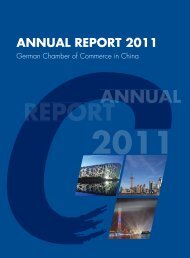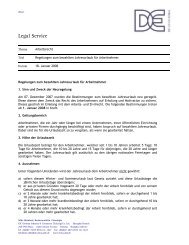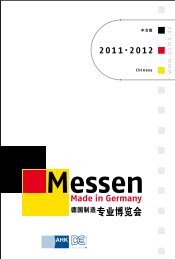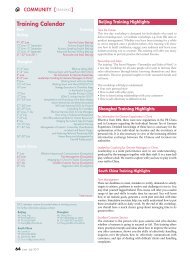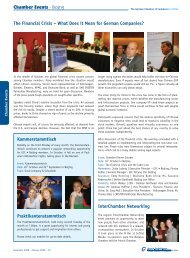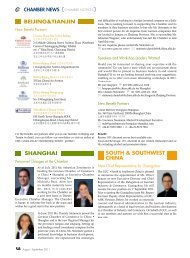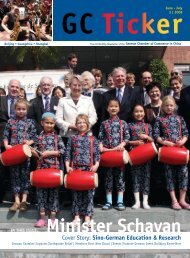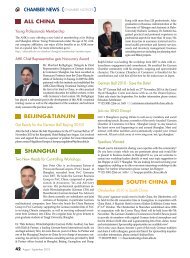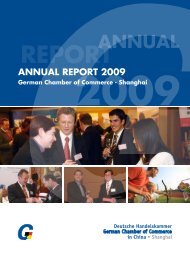Minister Steinmeier - AHKs
Minister Steinmeier - AHKs
Minister Steinmeier - AHKs
Create successful ePaper yourself
Turn your PDF publications into a flip-book with our unique Google optimized e-Paper software.
The German Chamber of Commerce in China<br />
Britta Ingenwepelt<br />
General Manager<br />
GEZE Industries (Tianjin) Co. Ltd.<br />
Britta Ingenwepelt’s<br />
father<br />
always wanted<br />
her to be an<br />
engineer. She<br />
found the profession<br />
suited both<br />
her temperament<br />
and interests. In<br />
China, she says,<br />
customers often first shake hands with a<br />
male staff member travelling with her, but<br />
she attributes this more to her youth than<br />
her sex. All in all, she adds, being a woman<br />
in the manufacturing industry has drawn<br />
greater attention to her, and that has been<br />
an advantage. The one thing she doesn’t<br />
regularly do here in China however, is the<br />
dinner and karaoke circuit. Quite often, she<br />
says, she isn’t even asked to join, while male<br />
employees are. As a German, she would have<br />
no problem with a beer or two at dinner<br />
time, she argues. In the end, not being a<br />
part of the ‘smoker’s club’ doesn’t hurt her,<br />
though.<br />
When sent to China by GEZE, Ingenwepelt<br />
recalls, there was a single General<br />
Manager handling everything. Then business<br />
expanded rapidly, so the position was<br />
divided. To her surprise, she was immediately<br />
recommended for the GM Production<br />
position. As she had already established<br />
credibility with her colleagues at work,<br />
there was no question about their accepting<br />
her ideas or directives.<br />
Soft spoken, but precise, Ingenwepelt says<br />
that China requires a more emotional leadership<br />
style. “At your wedding in Germany,<br />
perhaps 3% of your guests will be from<br />
work. In China, it’s 80%,” she says. This<br />
may be an advantage for women. Additionally,<br />
the help of ayis, grandparents and<br />
drivers help working moms have more free<br />
time.<br />
Asked for a further comparison, she found<br />
both production and sales culture to be<br />
very similar, and China to be much more<br />
open than expected. One telltale sign that<br />
China offers true quality of life reveals<br />
itself at the spa: men are assigned a masseuse,<br />
and ladies are assigned a handsome<br />
masseur. Sometimes, it’s not hard to be a<br />
woman.<br />
Michaela Stolz-Schmitz<br />
Vice President of Siemens Ltd. China<br />
Director of Corporate Marketing and<br />
the 2008 Projects Department<br />
Michaela Stolz-<br />
Schmitz first came<br />
to China nearly 15<br />
years ago as the<br />
Chief Representative<br />
of a German<br />
specialty steel<br />
manufacturer.<br />
Having studied<br />
economics, political<br />
science and sinology, she was prepared<br />
for China’s culture. Years as an international<br />
journalist (Süd-West Funk, ARD) made her<br />
aware of political and economic issues in<br />
Asia.<br />
She says there are more women in the ranks<br />
of the technical professions in China, even at<br />
higher levels. This helped her to gain acceptance<br />
with clients. As for gaining acceptance<br />
with employees, Stolz-Schmitz maintains<br />
that in China success very much depends<br />
on a manager’s ability to be better than the<br />
team, to further the team’s learning and to<br />
enable the team to win. However, it also<br />
depends on the ability to take an interest in<br />
individuals, strengthening their relationship<br />
with both the team and company by showing<br />
concern for their personal and professional<br />
well-being. While the ability to do this isn’t<br />
necessarily male or female, it is important to<br />
success. Perhaps women, she says, are quite<br />
adept at feeling the pulse of a team.<br />
From her first position, Stolz-Schmitz moved<br />
through the founding of a JV in steel, and a<br />
Chief Representative position in the medtech<br />
field, which led her to her appointment at<br />
Siemens. Returning to China in her current<br />
position at corporate marketing, she also<br />
took charge of the ‘2008 Project Office’ in<br />
2005. It aimed to support the many projects<br />
China was planning to execute for the big<br />
event in 2008. In all, Siemens gained more<br />
than EUR 1bn in business. As a great contributor<br />
to this success, Stolz-Schmitz seems<br />
to be a textbook case of the talented executive<br />
for whom China is a significant part of<br />
an international career.<br />
At Siemens China, by the way, the malefemale<br />
ratio is 63:37 overall, and 69:31 at<br />
the management level, a fact Michaela feels<br />
makes her proud.<br />
Sino - German Business<br />
Ms. Renate Tietjen<br />
Chief Representative<br />
C. Melchers GmbH & Co. KG<br />
Guangzhou & Chongqing<br />
Ms. Renate Tietjen has<br />
been working in China<br />
for C. Melchers GmbH<br />
& Co. KG since 1997.<br />
Additionally, she is<br />
active as a long-term<br />
GCC • Guangzhou board<br />
member and the organizer<br />
of Women in Business<br />
in Guangzhou.<br />
When asked “Why China?” she responded: “By<br />
accident I learned about the university program<br />
in my hometown “Economics & Chinese” and<br />
within 2 weeks I was enrolled. Afterwards<br />
C. Melchers GmbH & Co. KG offered me the<br />
position of Purchase Manager in Shanghai.<br />
The Melchers Group sponsors the Economics/<br />
Chinese faculty at Bremen University and over<br />
the years they have employed many female<br />
graduates in their overseas branches.”<br />
Tietjen feels that not only a stay in Asia but<br />
even frequent business trips here are beneficial<br />
to career development. She has noticed many<br />
female managers in high positions in US MNCs<br />
in the Pearl River Delta, but only a handful of<br />
German female managers are in the region. “In<br />
general, I believe that an increasing number of<br />
women - if given the opportunity - will consider<br />
an overseas stay more seriously. The question<br />
is how many will really commit themselves and<br />
head out,” she said.<br />
Based on her experience, there is more<br />
gender equality in the workplace here than<br />
in Germany. “Indeed it surprised me that<br />
the Chinese are not as gender minded as<br />
Germans…women do hold up half the sky. I<br />
am fully accepted in my position as a female<br />
Chief Representative…for German female managers<br />
the greatest challenge [in China] is to<br />
prove to their German counterparts that they<br />
are just as capable as men.”<br />
GC Ticker asked Tietjen if she had a particular<br />
female entrepreneur she admired. The answer:<br />
Anita Roddick, Founder of The Body Shop.<br />
“Against all odds and far earlier than all other<br />
cosmetic companies she stressed environmental<br />
protection and no animal testing but still<br />
managed to establish a world-wide renowned<br />
brand and company.”<br />
www.china.ahk.de 13 | August - September 2008<br />
Business Focus




